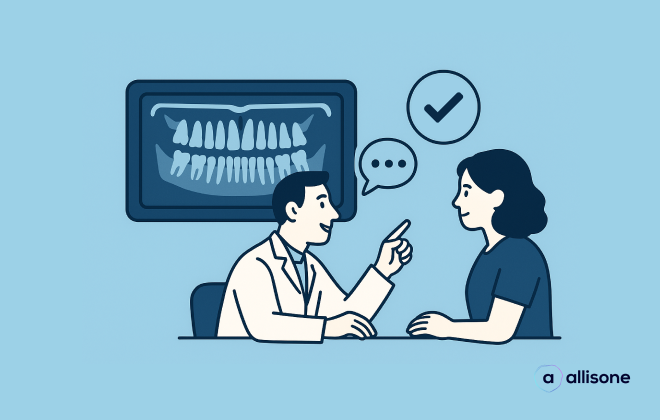
Dental practices often perceive inspections carried out by the Agences Régionales de Santé (ARS) as rare events, or those reserved for larger structures. However, this perception is no longer in line with the reality of current practices. The aim of these inspections is to guarantee the safety of care, and to ensure that every practice, whatever its size, complies with current health standards and legal obligations. Faced with changing regulatory requirements, dental surgeons and health center managers need to be prepared for these inspections, which can occur at any time, either as part of a routine inspection or following a report.
What is an ARS inspection?
Who is affected by ARS inspections?
ARS inspections, far from being sporadic events, now affect all types of structure: every healthcare establishment open to the public is potentially subject to these controls. Dental practices are no exception to the rule, even if they may sometimes perceive these inspections as being mainly reserved for larger establishments.
Dental practices and health centers are targeted because of their importance in the healthcare chain. The aim of these controls is to guarantee the quality of care delivered to patients, health safety and compliance with current legal standards. Healthcare establishments are also audited to ensure that their internal management, particularly with regard to medical and surgical procedures, complies with safety and traceability requirements.
Why does an ARS inspection occur?
There are several reasons why an ARS inspection may be required. In some cases, inspections are carried out as part of national or routine control campaigns, notably to ensure that good health practices are being applied. But other factors may trigger a specific inspection, such as a report from a patient or another healthcare professional, or a serious adverse event (SAE) occurring in the facility. It is therefore crucial for dentists and dental center managers to anticipate these controls and ensure that all standards are respected.
What are the objectives of these controls?
The primary aim of ARS inspections is to ensure that patient care is delivered in a safe and compliant environment. This includes several areas of verification:
- Patient safety: check that hygiene and sterilization protocols are respected, especially when using surgical instruments.
- Compliance with health standards: ensure that the facility complies with guidelines on medical waste management, infection prevention and radiation protection.
- Application of best professional practices: inspections also assess the skills of medical teams, their ongoing training and the compliance of their clinical practices with the latest recommendations.
Dental practices must therefore maintain constant administrative and medical rigor to avoid possible sanctions or recommendations in the event of an inspection.
How does an ARS inspection work?
ARS inspections follow a well-defined process, and ARS inspectors act meticulously to ensure that the establishment complies with health safety and good practice standards, which implies administrative rigor and precise document management.
What are the legal requirements?
The checks focus on several areas of legal obligation that every dental practice must comply with:
- Health and hygiene obligations: inspectors check that instrument sterilization protocols comply with current directives. Compliance with disinfection procedures between each patient and the management of medical waste (DASRI) are also scrutinized.
- Radiation protection: the use of X-ray equipment is subject to strict regulations. Inspectors are checking that dentists comply with radiation protection standards, that equipment checks are carried out regularly, and that staff are trained to handle these devices in accordance with the law.
- Training management: it is essential to keep track of practitioners' ongoing training, and it is compulsory for dentists to follow a Continuing Professional Development (CPD) program. Inspectors can ask for proof of these training courses to check that professionals are up to date in their knowledge.
What documentation is required?
An ARS inspection requires the firm to present rigorous documentation, such as:
- Le cahier de stérilisation : il doit détailler les cycles de stérilisation effectués, les tests réalisés (comme le test de Bowie-Dick) et la traçabilité des instruments utilisés.
- Traceability of radiological procedures: each X-ray image must be justified by a precise medical indication. The inspectors ensure that these documents are kept and easily accessible. Allisone makes it easy to annotate your X-ray images without wasting time.
- Training follow-up sheets: Each member of the team must be able to prove that he or she has taken the mandatory training courses, particularly in radiation protection and occupational risk management.
How does the inspection process work?
An ARS inspection takes place in several precise stages:
- Preparation: inspections can be planned or unannounced. A well-organized firm should be able to respond to both types of situation without difficulty.
- On-site visit: inspectors carry out a direct assessment of the facilities, checking the premises, equipment and procedures in place. They also examine patient records to ensure compliance with safety standards and quality of care.
- Drawing up the report: after the visit, a report is drawn up, detailing observations and any non-conformities. If any shortcomings are identified, recommendations or prescriptions are issued, and the firm must respond within a set timeframe.
- The adversarial procedure: Before any potential sanction, the firm has the opportunity to respond to the observations made in the report, to provide explanations or to prove that it has already implemented the necessary corrections.
What are the risks of non-compliance?
ARS inspections are not just administrative processes. They can have serious consequences for dental practices, especially if major non-conformities are identified. Practitioners need to be fully aware of the penalties that await them if they fail to comply with imposed standards.
What are the possible penalties?
Depending on the conclusions of the report, different sanctions may be applied:
- Recommendations: non-binding advice on how to improve certain practices.
- Prescriptions: unlike recommendations, prescriptions are legal obligations that must be complied with within a specific timeframe. Failure to comply may result in more severe penalties.
- Fines: In the event of repeated or serious breaches, the ARS can impose fines. These financial penalties are proportionate to the seriousness of the infringements. For example, poor management of radiation protection, such as failure to justify radiological procedures, can result in a fine of €22 per undocumented exposure. These amounts can quickly escalate if infringements are recurrent. With Allisone, you can automatically generate a report from a panoramic X-ray, detailing the elements observed by tooth number or by element.
- Temporary or permanent closure: In the event of major non-compliance, the ARS can order the suspension of the practice's activity until the deficiencies have been rectified, or even permanent closure if patients are endangered. This can happen if the practice fails to meet basic health standards, or if unsafe practices are identified, such as unsafe use of radiology equipment.
- Tax reassessments: Another often overlooked risk is that of tax reassessments. If discrepancies are identified during an inspection, they can lead to additional tax audits that add to the firm's administrative burden.
What are the specific requirements for panoramic radiology?
The legal requirements for radiology are particularly strict, and dental practices must comply with them scrupulously. Panoramic radiography is common practice, but requires rigorous management to ensure patient safety and compliance with standards.
- Medical justification: every X-ray examination must be medically justified and documented. This means that the patient's file must include a clear explanation of the need for the X-ray. ARS inspectors check that each procedure is properly documented.
- Traceability of radiological procedures: all images must be archived and accessible in the event of an inspection. The traceability of radiographic procedures includes not only the images themselves, but also the exposure parameters and the identity of the practitioner who carried out the examination. Allisone enables you to transfer your reports to your patient files in your patient software at the click of a button (integrations with Desmos, Julie, Veasy, WeCleverDental and LogosW).
- Team training: staff handling X-ray equipment must have undergone specific training in radiation protection. The ARS inspector will require proof that this training has been completed on time.
Focus on radiation protection
Radiation protection is a particularly closely scrutinized area during ARS inspections. Practitioners are required to appoint a Radiation Safety Officer (RSO), who is responsible for radiation safety. This person ensures that :
- Dosimeters are used correctly by personnel exposed to radiation.
- X-ray equipment is regularly inspected by approved organizations.
- Individual and collective protection measures are put in place.
Penalties for non-compliance with radiation protection obligations can be severe, including closure of the practice if major risks to patients or workers are detected.
ARS inspections are not a myth, but a reality for which all dental practices need to be seriously prepared. By ensuring that health standards are respected, that radiological procedures are justified, that care is traceable, and that their staff are properly trained, dentists can ensure that their practice meets the requirements imposed by the health authorities. Although the penalties for non-compliance can be severe, it is possible to anticipate these controls by implementing rigorous protocols.
Allisone makes it easy for you to manage the traceability of radiological procedures, and helps you to prepare your radiology reports on a daily basis. To find out more, read our dedicated article → X-ray reports: a legal requirement?
Articles en lien
Lorem ipsum dolor sit amet, consectetur adipiscing elit.

L’intelligence artificielle au cœur des soins dentaires : témoignage du Dr Paola

Mieux faire accepter les plans de traitement : 4 leviers qui fonctionnent vraiment






